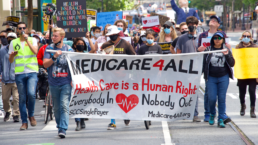Tens of millions of people continue to have no form of health insurance while the most expensive health care system in the world continues to get even more unaffordable.
By Brady Rivera, Common Dreams
We’ve heard this line before—our medical system, as it currently stands, is very unreliable and expensive for the average person. You pay thousands to for-profit insurance companies, and you still have to pay hundreds out-of-pocket for medications and services not covered by our plans.
With so much money coming out of our pockets and so many gaps in our plans, one starts to wonder why we’re charged so much for insurance.

But what can we do about this? We do have the Affordable Care Act (ACA,) which helps connect residents to health insurers to get them the best, money-safe options. It has helped countless people get coverage that they otherwise wouldn’t have gotten. But is this really still enough? Tens of millions of people continue to have no form of health insurance while the most expensive health care system in the world continues to get even more unaffordable.
Mercer County has significant Hispanic (18.5% or 71,658 people) and Black (21.5% or 83,278 people) communities. As a public health worker in Mercer, I see how our current healthcare system somewhat helps our community, but still leaves many more of us behind, especially people of color.
Being on the front lines of both healthcare and the COVID-19 pandemic, and coming from the Trenton-Hamilton area where there is one of the largest concentrations of Black and Hispanic people, too many of us suffer from being uninsured.
In both communities, more than 1 in 5 of us are uninsured. This is an absurd statistic that really shows us how, despite living in the wealthiest country in the world and spending the most on health care, we are failing communities of color and aren’t doing enough to address this neglect.
This doesn’t even mention the poverty ceiling created by the eligibility requirements under the ACA subsidy program. If these individuals or families earn more money, they risk exceeding the income thresholds of these programs and losing their health coverage.
This creates an incentive to stay below a certain income level, disincentivizing upward class mobility and maintaining wealth stagnation—all to be able to keep the healthcare coverage that’s barely affordable. An income-based program risks leaving behind thousands of people. This becomes a racial issue as much as it is a public health issue.
Many here in our very own Mercer County already understand this, including many of our legislators. Rep. Bonnie Watson-Coleman is a co-sponsor of the Medicare For All House bill and the board of county commissioners unanimously passed a resolution to call on Congress to pass it. The Princeton and Trenton municipal councils have passed local resolutions calling for the bill to pass.
We cannot wait any longer. There is a growing movement for a solution on the scale of the crisis in our health care system. Several residents of the state’s 3rd Congressional District have attended town halls and have urged our delegation to support Medicare For All, and continue to do s
Rep. Andy Kim, this is an urgent call to you to support Medicare for All.
The ACA was never meant to be the end; it was meant to be a step forward to improve our system. If we are to be the wealthiest and most innovative nation on Earth, we must care for the people who actually do the work to make us just that.
Recent Posts
‘Unconstitutional. Unethical. Authoritarian.’ ICE Bars Millions Of Immigrants From Bond Hearings
July 18, 2025
Take Action Now One watchdog said the new policy “seems like a blatant attempt to stop them from exercising their right to due process.”……
Americans Are Not Nearly Alarmed Enough About Climate Change
July 18, 2025
Take Action Now Americans still don’t comprehend how imminent, dangerous, and far-reaching the threat is—and journalists are partly to blame.By…
The IRS Is Building A Vast System To Share Millions Of Taxpayers’ Data With ICE
July 17, 2025
Take Action Now ProPublica has obtained the blueprint for the Trump administration’s unprecedented plan to turn over IRS records to Homeland Security…
Israel’s Sudden Assault On Syria Is Unchecked Aggression
July 17, 2025
Take Action Now Jerusalem is bombing Damascus and threatening al-Sharaa’s rule, while Washington was hoping to help the nascent government on…




